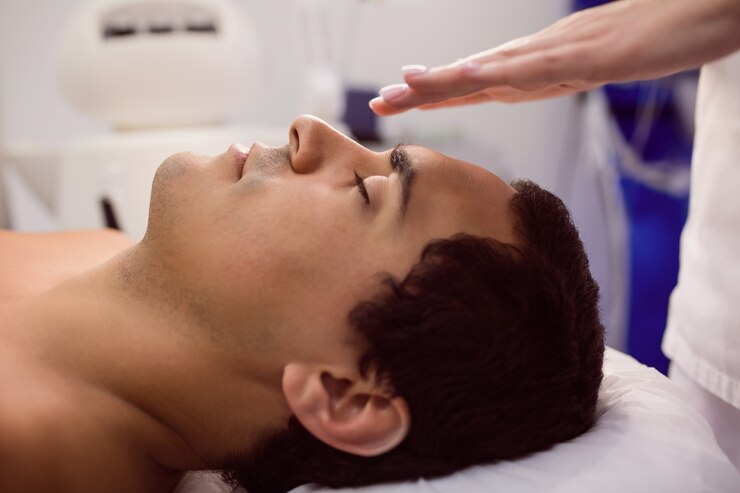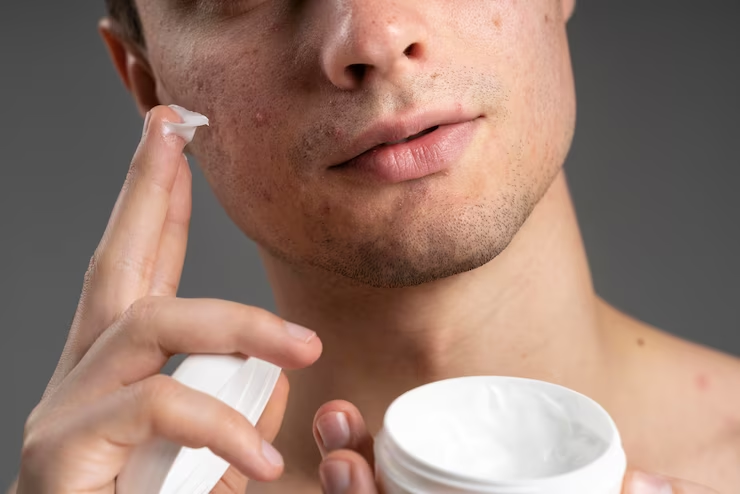
Acne is a skin condition that affects millions of people worldwide, causing not only physical discomfort but also emotional distress. The quest for a clear and blemish-free complexion has led individuals to explore various treatment options, with one promising solution standing out: acne laser treatment. This advanced dermatological procedure has gained significant popularity due to its effectiveness in combating acne and improving overall skin health.
In this blog post, we will delve into the world of acne laser treatment, exploring its benefits, the treatment process, possible side effects, and post-treatment care. So, if you're tired of battling persistent breakouts and searching for a long-lasting solution, keep reading to discover how acne laser treatment can be your ticket to smoother, clearer skin.
How Acne Affects The Skin

Acne can have various effects on the skin, ranging from physical changes to emotional and psychological impacts. Here are some ways acne can affect the skin:
Inflammation and Redness
: Acne often manifests as red, inflamed bumps on the skin. The presence of acne lesions can cause localized inflammation and redness, making the affected areas appear visibly irritated.Breakouts and Lesions
: Acne typically includes various types of lesions, such as whiteheads, blackheads, papules, pustules, nodules, and cysts. These lesions can appear as raised bumps, pus-filled pimples, or deeper, painful nodules. The presence of these breakouts can make the skin texture uneven and bumpy.Scarring
: Severe or persistent acne breakouts can lead to scarring. Acne scars can be classified as atrophic (indented) or hypertrophic (raised). Atrophic scars are commonly seen as small depressions or pits on the skin, while hypertrophic scars are raised and may be more visible. Acne scars can significantly impact the overall smoothness and clarity of the skin.Hyperpigmentation
: Following an acne breakout, the skin may experience post-inflammatory hyperpigmentation (PIH). PIH causes dark spots or patches to develop in areas where acne lesions have healed. These spots can persist for weeks or months, leading to uneven skin tone and discoloration.Oiliness and Shine
: Acne-prone skin often exhibits increased sebum (oil) production. Excess oiliness can contribute to a shiny appearance and make the skin feel greasy. This can be particularly prominent in the T-zone (forehead, nose, and chin).Dryness and Flakiness
: Some acne treatments, such as topical medications or harsh cleansing routines, can cause dryness.) and flakiness of the skin. This dryness can lead to a dull and lackluster complexion, further exacerbating the appearance of acne.Skin Sensitivity
: Acne-prone skin is often more sensitive and reactive. It can be easily irritated by external factors such as certain skincare products, environmental pollutants, or abrasive materials. Increased skin sensitivity can contribute to discomfort and exacerbate acne symptoms.Psychological and Emotional Impact
: Beyond the physical effects, acne can also have significant psychological and emotional impacts. Acne can lower self-esteem, diminish self-confidence, and cause feelings of embarrassment or self-consciousness. It can affect social interactions and quality of life, leading to emotional distress or anxiety.Different Types of Acne Scars

When it comes to acne scars, there are different types that can manifest on the skin. Understanding these different types can help in identifying the appropriate treatment approach.
Here are three common types of acne scars:
Boxcar Scars
Boxcar scars are characterized by their well-defined edges and box-like shape. They often appear as depressed areas with sharp edges on the skin. These scars are caused by the destruction of collagen and tissue during the healing process of inflammatory acne. Boxcar scars can vary in size and depth, and they are commonly found on the cheeks and temples.
Ice Pick Scars
Ice pick scars are narrow, deep, and pitted scars that resemble small puncture marks on the skin's surface. They are usually narrower than they are deep, giving them their name. Ice pick scars result from the loss of tissue that occurs when deep acne lesions penetrate the skin. These scars are often more challenging to treat due to their depth.
Rolling Scars
Rolling scars have a wavy or rolling appearance on the skin, creating an uneven texture. They are caused by the pulling of fibrous bands between the skin's layers, creating a tethering effect. Rolling scars give the skin a slightly undulating or "rolling hills" appearance. These scars are typically shallow and can be more widespread on the face.
Benefits of Acne Laser Treatment

Acne laser treatment offers several benefits for individuals struggling with acne. Here are some key advantages of acne laser treatment:
Targeted Approach
Acne laser treatment provides a targeted approach to address acne and its underlying causes. The lasers used in the treatment can specifically target acne-causing bacteria, reduce inflammation, and regulate sebum production. This focused treatment helps to effectively combat acne breakouts at their source.
Reduction in Acne Breakouts
Laser therapy has been found to significantly reduce the frequency and severity of acne breakouts. By targeting the bacteria responsible for acne and reducing inflammation, laser treatment can help minimize the occurrence of new acne lesions and promote clearer skin.
Improved Appearance of Acne Scars
Acne laser treatment can also help improve the appearance of acne scars. The laser energy stimulates collagen production in the skin, promoting the growth of new, healthy skin cells. This can lead to a reduction in the visibility of acne scars, resulting in smoother and more even-toned skin.
Non-Invasive or Minimally Invasive
Acne laser treatment is generally non-invasive or minimally invasive, depending on the type of laser used. It does not involve surgical incisions or extensive downtime associated with invasive procedures. This makes it a convenient option for individuals seeking effective acne treatment without significant discomfort or lengthy recovery periods.
Minimal Downtime
Compared to certain other acne treatments, acne laser treatment typically involves minimal downtime. After the procedure, most individuals can resume their regular activities immediately or within a short period. This makes it a convenient choice for those with busy lifestyles or work commitments.
Customizable for Different Skin Types
Acne laser treatment can be customized to suit different skin types and acne conditions. Dermatologists and skincare professionals can adjust the settings of the laser to accommodate individual skin sensitivities and treatment requirements. This personalized approach ensures that the treatment is tailored to each person's unique needs.
Long-lasting Results
Acne laser treatment aims to provide long-lasting results. While multiple treatment sessions may be required, the effects of the treatment can be seen for an extended period. By targeting the root causes of acne, laser therapy helps to minimize acne breakouts, reduce inflammation, and improve overall skin health.
How Acne Laser Treatment Works
The process of laser treatment for acne involves several steps that are tailored to the individual's specific needs and the severity of their acne condition. Here's an overview of the typical process:
Consultation
The first step is to schedule a consultation with a dermatologist or skincare professional experienced in laser treatment for acne. During this initial appointment, the healthcare provider will evaluate your skin condition, assess the severity of your acne, and discuss your treatment goals. They will also determine if you are a suitable candidate for laser treatment.
Pre-Treatment Preparations
Before the laser treatment session, you may be instructed to prepare your skin by avoiding excessive sun exposure, tanning beds, and certain skincare products that could sensitize your skin. Your healthcare provider will provide specific guidelines tailored to your needs.
Cleansing and Anesthesia
On the day of the treatment, the skin will be thoroughly cleansed to remove any dirt, oil, or makeup. Depending on the type and intensity of the laser being used, a topical numbing cream may be applied to minimize any discomfort during the procedure. This step ensures your comfort throughout the treatment.
Eye Protection
To safeguard your eyes from the laser's light, you will be provided with protective goggles or shields to wear during the treatment.
Laser Application
The healthcare professional will use a handheld laser device to administer the treatment to the targeted areas of your skin. The laser emits precise wavelengths of light that penetrate the skin's surface and target specific acne-causing bacteria, reduce inflammation, and stimulate collagen production.
Sensations and Cooling
During the treatment, you may experience mild sensations such as warmth, tingling, or a slight snapping feeling as the laser energy is delivered to your skin. Some lasers incorporate cooling mechanisms to minimize discomfort and protect the outer layer of your skin.
Duration and Number of Sessions
The duration of each laser treatment session can vary depending on factors such as the size of the treatment area and the specific type of laser used. Treatment sessions typically range from a few minutes to an hour. The number of sessions required varies as well, depending on the severity of your acne and the response of your skin to the treatment. Your healthcare provider will recommend a treatment plan tailored to your needs.
Post-Treatment Care
After the laser treatment, you may experience temporary redness, mild swelling, or a sensation similar to sunburn in the treated areas. Your healthcare provider will provide instructions for post-treatment care, which may include applying soothing creams, avoiding excessive sun exposure, and following a gentle skincare routine.
Follow-up Sessions
To achieve optimal results, multiple laser treatment sessions are typically required. These sessions are usually spaced out over several weeks or months to allow your skin to heal and respond to the treatment effectively.
Throughout the process, it's essential to communicate openly with your healthcare provider and follow their instructions to ensure the best possible outcome. Laser treatment for acne is a specialized procedure that requires the expertise of a qualified professional to achieve safe and effective results.
Possible Side Effects of Acne Laser Treatment

When considering laser acne scar removal, it's important to be aware of potential side effects and considerations. While laser treatments for acne scars are generally safe, there are a few factors to keep in mind.
Here are some possible side effects and considerations associated with laser acne scar removal:
Temporary Skin Reactions
After laser treatment, it is common to experience temporary side effects such as redness, swelling, and mild discomfort in the treated area. These reactions typically subside within a few days to a week.
Skin Sensitivity
Following laser acne scar removal, your skin may become temporarily more sensitive to sunlight. It is crucial to protect your skin from sun exposure by using broad-spectrum sunscreen, wearing protective clothing, and avoiding direct sunlight for a certain period as advised by your healthcare provider.
Pigmentation Changes
In some cases, laser treatments can cause temporary or, rarely, permanent changes in skin pigmentation. This may result in darkening (hyperpigmentation) or lightening (hypopigmentation) of the treated area. These pigment changes are typically more common in individuals with darker skin tones.
Risk of Infection
Although rare, there is a minimal risk of infection following laser acne scar removal. To minimize this risk, it's important to follow proper post-treatment care instructions, including keeping the treated area clean and avoiding touching or picking at the skin.
Scarring
While laser treatments are intended to reduce the appearance of scars, there is a slight risk of developing new scars or worsening existing ones. This risk is generally low, especially when performed by a skilled and experienced healthcare professional.
Multiple Treatment Sessions
Achieving significant improvement in acne scars often requires multiple treatment sessions. It's important to have realistic expectations and understand that the results may be gradual and progressive over the course of several treatments.
Pre-Existing Skin Conditions
Laser acne scar removal may not be suitable for individuals with certain pre-existing skin conditions, such as active acne breakouts, [eczema](https://www.mayoclinic.org/diseases-conditions/atopic-dermatitis-eczema/symptoms-causes/syc-20353273#:~:text=Atopic%20dermatitis%20(eczema), psoriasis, or skin infections. Inform your healthcare provider about any pre-existing skin conditions to ensure the appropriate treatment approach.
Individual Response and Results
Each individual's response to laser acne scar removal can vary. The effectiveness of the treatment depends on factors such as the type and severity of the scars, skin type, and individual healing capabilities. It's essential to have a consultation with a qualified healthcare provider who can assess your specific case and discuss the expected results and potential limitations.
Post-Treatment Care and Results
Post-treatment care is crucial after undergoing laser acne scar removal to ensure optimal healing and maximize the results. Here are some important considerations regarding post-treatment care and what to expect in terms of results:

Follow Provider's Instructions
Your healthcare provider will provide specific instructions on post-treatment care. It is essential to follow these instructions carefully to promote proper healing and minimize the risk of complications.
Sun Protection
Protecting your skin from sun exposure is critical after laser acne scar removal. The treated skin may be more sensitive to sunlight, and exposure to UV rays can increase the risk of pigmentation changes and hinder the healing process. Apply broad-spectrum sunscreen with SPF 30 or higher to the treated area, and consider wearing protective clothing and a wide-brimmed hat when outdoors.
Gentle Skincare Routine
Avoid using harsh or abrasive skincare products on the treated area for a certain period as advised by your healthcare provider. Use gentle cleansers and moisturizers to keep the skin hydrated and promote healing.
Avoid Irritants
Avoid exposing the treated area to potential irritants, such as excessive heat, chlorine in swimming pools, saunas, or hot tubs. These can irritate the skin and delay the healing process.
Patience and Healing Time
Healing and results can vary among individuals. It's important to have realistic expectations and understand that the improvement in acne scars may be gradual. It may take several weeks or even months to see the full effects of the laser treatment as your skin continues to heal and regenerate.
Multiple Treatment Sessions
Laser acne scar removal often requires multiple treatment sessions to achieve significant results. Your healthcare provider will recommend the appropriate number of sessions based on your specific needs and response to the treatment.
Long-Term Results
Laser acne scar removal can provide long-term results, but it's important to maintain a healthy skincare routine and protect your skin from further damage. Consistent skincare practices, sun protection, and avoiding factors that can exacerbate acne breakouts will help maintain the improvements achieved with the treatment.
Individual Response
Every individual's response to laser acne scar removal can vary. While many people experience significant improvement in the appearance of their acne scars, the results cannot be guaranteed. The effectiveness of the treatment depends on factors such as the type and severity of the scars, skin type, and individual healing capabilities.
Consultation and Follow-up
Stay in contact with your healthcare provider and schedule any recommended follow-up appointments. They will monitor your progress, assess the results, and make further recommendations if necessary.
Frequently Asked Questions
Is Laser Acne Scar Removal Effective?
Yes! Laser acne scar removal is an effective treatment option for reducing the appearance of acne scars. It stimulates collagen production, targets scar tissue, and promotes the growth of healthier skin cells which can lead to visible improvements in scar texture and overall appearance.
Is Acne Laser Treatment Safe?
Definitely. Laser treatments for acne scars are indeed considered a non-invasive approach to improving the appearance of scars. They have received FDA approval, indicating that they have undergone rigorous testing to ensure their safety and effectiveness. Laser devices used for cosmetic purposes are specifically designed for treating various skin concerns, including acne scars.
What Is the Recovery Period For Laser Acne Scar Removal?
Immediately after the laser treatment, it is common to experience some temporary side effects such as redness, swelling, and mild discomfort in the treated area. These effects usually subside within a few hours to a couple of days, but the duration can vary based on the intensity of the treatment.
Laser treatments stimulate the skin's natural healing process, and it typically takes around 3 to 10 days for the skin to renew itself after the procedure. During this time, the treated area may go through a process of shedding old, damaged skin cells and replacing them with fresh, new skin cells.
Conclusion
Acne laser treatment is a highly effective and safe option for addressing acne scars. By following proper post-treatment care instructions and consulting with a qualified healthcare professional, individuals can achieve significant improvements in the appearance of their skin. Acne laser treatment offers a promising solution for those seeking to diminish the impact of acne scars and regain smoother, more even skin.









